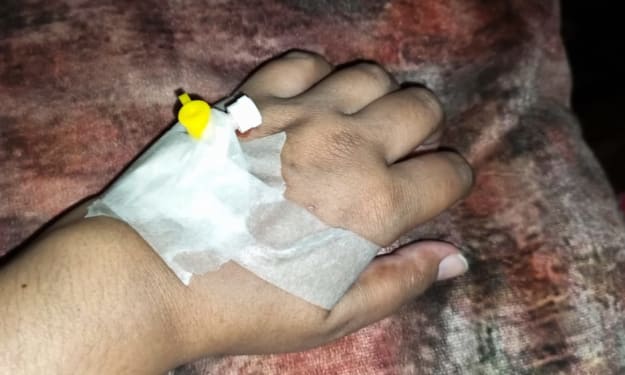Punching above the weight
A tale of suffering, smiles and stationery
The woman had been waiting for some time, sitting on a folding chair with the others, all men, waiting patiently, with her back to the wall of the small plastic cabin. She was African, wearing a red shirt, her black hair beautifully braided, striking in her patience and her dignity. Her small son was sitting on her knee, sometimes climbing down and standing beside her. He was bored and hot. She talked to him quietly. The door of the cabin was open, I’d left it that way because of the heat, and from outside came the sounds of the camp. Voices in an unknown Middle Eastern language, the cawing of some scavenging crows, the petrol generator humming, a distant electric saw. The sun slanted in through the scratched plastic windows, onto the screwed plywood floor. Beside me at my makeshift desk at the back of the cabin were several cardboard boxes full of paper. Notes, forms, explanations of processes, questionnaires, leaflets and booklets, all prepared by numberless volunteers to help explain things to the people who came to the cabin every day and waited, and waited. Most were from a small list of countries – Syria, Afghanistan, Iraq, Iran, Sudan, Eritrea, Libya. All the usual suspects. All the places where violence and war were making ordinary life impossible. Where that impossibility of living had driven all the people here to desperate decisions and trajectories that had spread them all across Europe and had today put them in front of me, in this little plastic hut in France. I talked to them, took notes as best I could, gained an understanding of their journeys, their histories en route, their situations now. Where they had been stopped, turned back, detained, jailed or beaten, and where some unknown person in authority had taken their fingerprints. And then I turned that into whatever advice I could possibly give them about their legal options, where to go next, who to talk to, where to turn. Often the advice was depressing, both for the giver and the receiver. News that you have no chance of achieving what you have been dreaming of through months of severe hardship is tough to swallow. Many couldn’t accept it. Many were simply trying to see if there was a legal way of doing what they intended to do anyway. Unsurprised by the negative answer, they would thank me politely and go back outside to continue their completely unchanged plans. For the few that I could help, there was a mountain of work to be done, and we all lived for those. That was why we were here.
It was the woman’s turn. She sat in front of me across the little table, her son on her knee. She spoke English well enough not to need an interpreter. She had come a long way from Africa. She told her whole story from place to place – horrible treatment in Libya, prison for a few months in Greece, losing touch with her friend at a border crossing, and how and when she had been raped twice on her journey. She told all this without an ounce of self-pity, without tears or horror, just as simple facts, and with an air of quiet acceptance of the truth about the worst parts of her story. I took it all in, and stopped taking notes after a while because it was clear I’d remember everything anyway, whether I wanted to or not. When she came to the end of her story, bringing us up to date on this sunny day in France, we paused and just sat there for a few moments, two people who had never met before, with all the brutal details sitting in the space between and around us. I took a mental deep breath, gathered my thoughts, and embarked on the next stage, of digging into some of the details so that I had the concrete information I needed about border crossings, police, prison, traffickers, dates. Her son was squirming in her lap, extremely bored now, trying to get out of her arms. Without thinking, I reached for the stapler on the desk, and stapled together the two sheets of paper I’d been writing on. The boy’s big dark eyes opened wide as he saw the two pages stick together with a click. He had stopped wriggling. His gaze was fixed on the stapler. Then he stared at me. I had just done a magic trick. He was in awe. Holding his gaze, and realising I couldn’t offer him the stapler for fear he might hurt himself, I reached across and took a blank sheet of A4 paper. Picking up the hole punch instead, I put it in front of him, slid the paper into it and pressed down firmly. Two neat circular holes appeared in the edge of the paper, again by sheer magic. He stared again, looked across at me and smiled. I pushed the hole punch to him and put the paper back in. He pressed down and squeezed hard until the job was done. Two more holes. He was mesmerised. His mother was chuckling now, and so was I. He put the paper back in to do it again.
And in that moment, a lot of things changed for me. The terrible details of her story and her journey to this moment, one like so many others, the legal technicalities of what could and could not be done for her, the byzantine complexities of international asylum law, and the awful, squalid conditions of the makeshift camp, all for that moment took a back seat, and we were enjoying her little boy discovering the wonders of the hole punch. It really was all that mattered. What mattered most, in all the horrors of the violent and terrifying world that they had been encountering, was that we were here today, not taking part in any of those horrors, and not being a part of them, but just sitting together, admitting those things exist but smiling and laughing for a moment because her son had come through it all, he was healthy and happy, and transfixed with wonder by a new toy.
That moment changed the way I work. In such situations now, I recognise the importance of this simple thing, that those terrible experiences aren’t a part of what we are doing. They are what we are acting against, and not by furious activism, not by turning everything into a caseload or a set of rules or an intellectual puzzle to be deciphered, but by simply being there. Being humans together. That’s what helps.
Though I hardly ever have occasion to use it, I always keep a hole punch on my desk.
About the Creator
Enjoyed the story? Support the Creator.
Subscribe for free to receive all their stories in your feed. You could also pledge your support or give them a one-off tip, letting them know you appreciate their work.






Comments
Jed Finn is not accepting comments at the moment
Want to show your support? Send them a one-off tip.